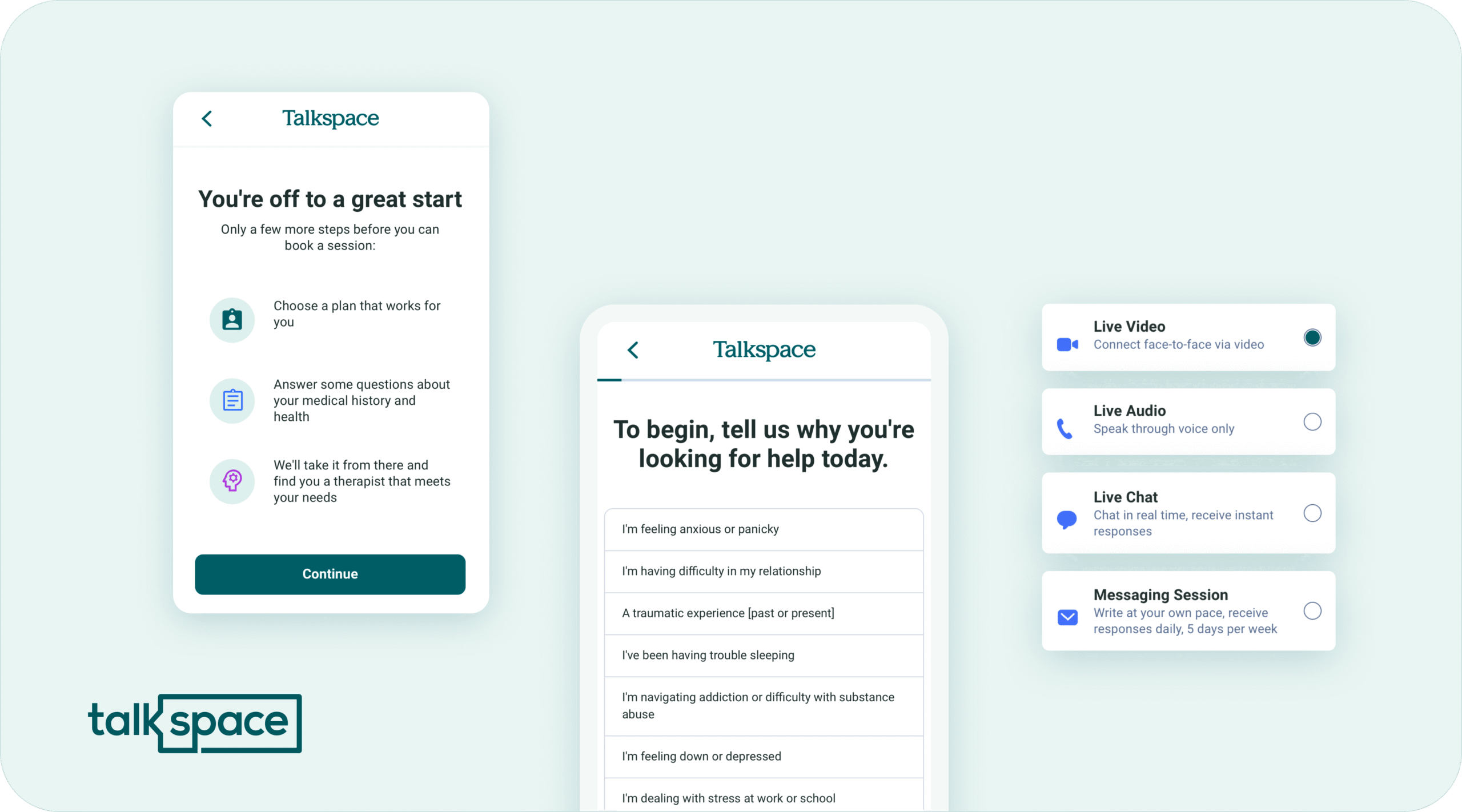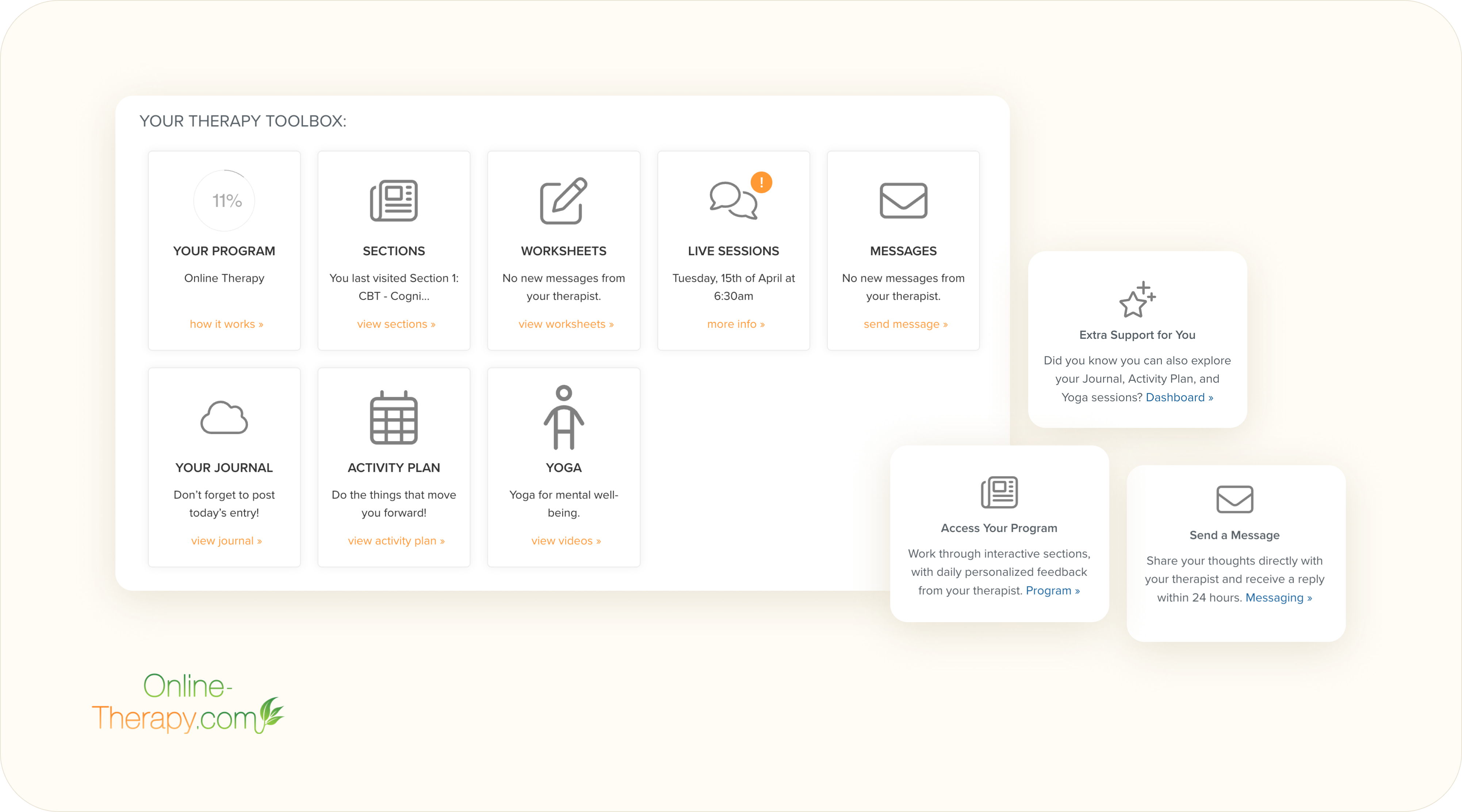Marriage Therapy for Infidelity: Can Couples Heal After Betrayal?
Infidelity can devastate a marriage, but healing is possible. Learn how therapy can be beneficial following an extramarital affair.

This therapist directory is offered in partnership with BetterHelp. If you sign up for therapy after clicking through from this site, HelpGuide will earn a commission. This helps us continue our nonprofit mission and continue to be there as a free mental health resource for everyone.
Need to talk to someone now? Find a crisis helpline
If you're a BetterHelp therapist with questions about your directory listing, please contact therapists@betterhelp.com
Looking for the best online couples therapy services? HelpGuide’s staff surveyed real users and personally tested and reviewed the top platforms to rate them on therapist quality, affordability, privacy and security, user experience, and effectiveness.

We independently test and review all of the services we recommend. When you sign up through our links, we may earn a commission, which helps support our nonprofit mission. Learn More ›
Couples therapy and marriage counseling offer a way to strengthen relationships, navigate conflicts, and even achieve individual growth—and these days, there are many online options that make it convenient. The HelpGuide team did a deep dive into 55 online couples therapy services, surveyed 400 couples who’ve done online counseling, and personally tested the four top options that met our qualifications. Here’s what we found.
Easy to use, good customer service, plus a helpful “Toolbox” for extra support
Visit siteOffers a pay-per-session model, rather than locking you into a monthly subscription
Visit siteAs a nonprofit organization, HelpGuide is dedicated to providing well-researched, helpful information that empowers people to improve their mental health—and we applied those same principles to our online couples counseling reviews. Our writers, editors, and other staff spent 300+ hours surveying online therapy users and researching and personally testing platforms.
We started with a comparative analysis of 55 reputable online therapy platforms that offer couples therapy or relationship counseling. Our team looked at 105 data points, including pricing, cancellation policies, privacy protections, average time to first appointment, types of therapy offered, and therapist diversity and availability. Then we weighted each factor and totaled up the scores to get our initial rankings. This helped us zero in on the services that offered the best value and user experience, and identify the most promising options for hands-on testing.
Next up, we tested the top-ranked options using HelpGuide staff members and their partners, as well as real HelpGuide users. We tried out each platform for a minimum of one month, using them in the same way regular couples would. Each couple signed up for a service, went through the intake process, and then—depending on the platform—we were either automatically matched with a therapist or selected one ourselves. Then we booked and attended regular therapy sessions, taking notes on the functionality of each platform as well as the quality of the therapists and the availability of additional mental health resources.
You don’t always match with the right therapist for your needs right out of the gate, so we made sure to switch providers and take notes on the process. We also tried out customer support and tested any messaging features that allowed us to reach out to providers between sessions. If the platform offered additional features, such as meditations or journals, we tested those out as well.
At the end of the testing phase, we closed our accounts, noting how easy (or difficult) it was and any billing surprises. Each of us kept weekly journals throughout the whole process and documented our findings in detailed questionnaires. We used both to compare the services and our couples therapy experiences.
We relied on licensed therapists, psychologists, and psychiatrists to review our evaluation criteria and our methodology. Their expertise and feedback played an important role, helping us refine how we scored platforms for therapist quality, care structure, and ethical standards. They helped ensure that our rankings take into account what really matters to couples in therapy, including professional integrity, emotional safety, and effectiveness.
We also wanted to hear from other real-world couples therapy users, so we reached out to 400 couples who have used the platforms we tested. They completed extensive surveys where we asked for their opinions on factors like therapist responsiveness, platform usability, technical issues, and overall satisfaction with the services. Their feedback played an important role in our scoring methodology and helped us form our final recommendations.


Therapist quality and matching accuracy

Pricing and value for money

Session types and communication options

Ease of use and platform navigation

Insurance Coverage and Payment Options

Privacy and Security

Customer Service experience
See how well Talkspace worked for people seeking couples therapy.

| Talkspace is most suitable for: | Couples interested in a monthly subscription that offers 30-minute sessions and a highly intuitive interface |
| Starting price: | $436 (billed monthly) |
| Insurance accepted? | Yes |
| Financial aid: | Available (23% of users) |
| Therapy types: | Individual, couples |
| Session formats: | Video, audio, text messaging |
| Time to first session with therapist: | 1-3 days |
| Psychiatry services: | Yes |
Tested by: Sheldon Reid, Staff Writer
A HelpGuide staff writer and his partner used Talkspace’s couples therapy for a month, attending two sessions. When it came to usability, they didn’t experience any issues with the platform, and the overall design felt intuitive. The therapy sessions were useful, but 30 minutes didn’t feel sufficient, and multiple last-minute cancellations led to scheduling frustrations.
The users we surveyed saw their therapists as supportive, and the platform as secure and easy to navigate. However, customer support could’ve been more responsive, and therapists could’ve been more consistent in assigning between-session exercises.
“The process was smooth and seamless, without any issues. Everything was explained in a clear and easy-to-understand manner.”
Survey respondent
“It was a good experience. It was easy to sign up. We had to switch therapists once, but once we did we were very happy.”
Survey respondent
Therapist performance:
Platform usability:
Usefulness in improving relationship:
Data and session security:
Value for cost:
Time spent on intake process: 10 to 30 minutes
Customer support responsiveness: Same day
Assigned between-session activities: Always
“Although they were a little too short, the sessions were useful, and we didn’t experience any technical glitches.”
Sheldon Reid, Staff Writer
Completing the intake process took 10 to 30 minutes for our HelpGuide testers. Initially, only one person had to complete a questionnaire, but later, the other partner also had to fill one out. The testers were able to specify preferences on factors like the therapist’s treatment approach and gender, but they wanted more options. Testers were automatically matched to a therapist on the same day they signed up.
The intake process seemed to be consistently smooth. Ninety-three percent of survey respondents said that sign-up was easy or very easy, and 77 percent finished it in under 20 minutes.
Our testers reached out to customer support multiple times for different reasons. Each time, they waited up to three days for a response. In one case, they received a canned response within hours, followed by a more helpful, personalized follow-up response three days later. This doesn’t appear to be an unusual wait time. Of the 19 percent of survey respondents who contacted customer support, 36 percent waited one to three days for a response. Two percent waited more than 3 days. Overall, our testers thought the responses could’ve been faster.
The platform’s messaging and video chat features felt straightforward and easy to use. Scheduling was also intuitive, but our testers encountered multiple last-minute requests from therapists to reschedule, which added frustration to the process.
Our HelpGuide testers didn’t run into any technical problems, but 15 percent of survey respondents reported issues while using the platform. Ninety-five percent of survey respondents felt that Talkspace did a good job of communicating their privacy policies.
The first therapist our testers matched with made a last-minute request to reschedule. She didn’t have any available time slots that worked for the testers, so they switched providers. Fortunately, switching was very easy. The testers were able to choose from a list of new providers, complete with bios and reasons why the app was recommending them.
The sessions mostly felt freeform and conversational, but they ended with the therapist assigning practical “homework.” The testers felt that the therapist didn’t seem as engaged during the second session, but overall, she was an excellent listener and made both participants feel heard.
The testers’ major complaint was that the sessions simply felt too short. One of them noted, “I am not convinced the 30-minute session framework is well thought through, or long enough to be truly useful.”
They were able to message their therapist between sessions, and she was extremely responsive. If you switch therapists, the platform also gives you the option to share your past chat history with the next provider.
The platform offered a list of pre-sessions questions to consider and a blog. Other tools included a symptom tracker and long- and short-term goal trackers, but the therapist didn’t make use of these tools.
Most survey respondents were satisfied with their therapists, seeing them as neutral and empathetic. When asked to rate their therapist satisfaction level on a scale of 1 to 5, 88 percent of respondents said 4 or 5. However, only 21 percent said that their therapist assigned follow-up work outside of every session.
Talkspace accepts insurance, however most insurance plans don’t cover online couples therapy. Our testers paid $436 out-of-pocket for a one-month subscription. They felt this was high for the level of service. “I wish there were more couples-specific tools and resources,” said one tester. The short sessions and frequent last-minute rescheduling requests also felt like significant downsides.
Most of the respondents, on the other hand, said the service offered excellent value for the cost. Ninety-one percent of survey respondents said they didn’t experience unexpected charges.
The service’s cancellation policy is easily found in the Help Center. To cancel, a user simply goes to “account,” “payment and plan,” and then selects “stop subscription renewal.”
Our total score
Based on expert testing and real user feedback
Talkspace is a good option if you want a service that gets high marks from users for the quality of its therapists and makes it easy to sign up and get started. However, if you and your partner feel that 30-minute sessions are too short, you might consider a different platform.
See what HelpGuide users and surveyed couples thought of Thriveworks couples therapy.

| Thriveworks is most suitable for: | Couples who would prefer paying per session, rather than committing to a monthly subscription |
| Starting price: | $200 per session (can also vary by provider) |
| Insurance accepted? | Yes |
| Financial aid: | No |
| Therapy types: | Individual, couples, family, teen |
| Session formats: | Video, audio |
| Time to first session with therapist: | 1-3 days |
| Psychiatry services: | Yes |
Tested by: Kevin B., HelpGuide user
A HelpGuide user and his partner tried out Thriveworks for a month, attending two sessions. While the intake process was quick and simple, it left little room to specify therapist preferences. The actual therapy experience felt rushed yet unguided, and our testers found that last-minute cancellations were a point of frustration. Despite all this, the platform itself functioned well, and no major technical issues came up during the testing.
In addition to having HelpGuide users perform hands-on testing, we surveyed a wide range of couples about their Thriveworks experience. Generally, these users gave the service better scores than our testers. Therapist satisfication was high, although a small number of respondents (10 percent) ran into technical issues.
“Thriveworks is very user-friendly and really focuses on goals and results.”
Survey respondent
“The process was easy, convenient, and mostly effective overall.”
Survey respondent
Therapist performance:
Platform usability:
Usefulness in improving relationship:
Data and session security:
Value for cost:
Time spent on intake process: Less than 10 minutes
Customer support responsiveness: Under 1 hour
Assigned between-session assignments: Never
“Thriveworks didn’t meet our expectations. The process felt overly clinical and disorganized.”
Kevin B., HelpGuide user
The testers were able to finish the intake process in under 10 minutes, but reported it simply involved inputting their name and financial information. Afterward, they were able to choose a therapist from a list. The list was based on their location. Although the therapists’ credentials were given, our testers reported that the bios were not detailed enough. “I think Thriveworks could benefit from better therapist matching,” one of the testers noted.
When it came to using the platform, our testers didn’t notice any technical issues. However, they noted that the platform lacked a messaging feature to reach out to their therapist between sessions. They also had issues with the scheduling process. “Scheduling was confusing, and we had issues with last-minute cancellations.”
Survey respondents also found the sign-up process to be quick and intuitive. Eighty percent completed the process in under 20 minutes. Most of them had a favorable view of the service’s overall usability, including scheduling and the session platform, but 10 percent of respondents ran into technical issues.
The testers reached out to Thriveworks customer support through a phone call. They received a response in under an hour. Nineteen percent of survey respondents contacted customer support as well, and of those users, 69 percent received a response within 24 hours.
Ninety-four percent of respondents said that the platform’s privacy and confidentiality policies were clear. Most felt assured that the communication with therapists was generally safe and secure.
Although it was useful to have a neutral space to voice relationship concerns, the testers felt like their therapist wasn’t engaged or prepared. The sessions felt freeform, with little direction from the therapist. The therapist also didn’t assign exercises or activities to work on between sessions. “They didn’t ask many questions or offer tools we could apply outside of sessions. It felt like they were going through the motions rather than actively helping us work through our issues as a couple.”
Overall, survey respondents seemed more satisfied with their therapists than the testers did. Most of them said their provider remained neutral and balanced, and both partners often felt heard during sessions. Sixteen percent of the respondents said they switched therapists at some point, and, of those, nearly all of them said it was easy or very easy to switch therapists.
In addition to therapy sessions, Thriveworks gives you access to Fireside, a video collection of courses led by mental health experts. These cover topics like managing trauma, anxiety, and eating disorders.
The testers paid $200 per session. They reported this to be a poor value for the level of care and support they received. “We really wanted this to work, but overall, the experience felt disorganized and not tailored to couples.”
It’s important to note that Thriveworks accepts most major insurance plans, which can lower the cost of couples therapy. However, our testers reported that if a couple isn’t using insurance, the session costs are based on the therapist, which makes the billing and pricing information a little confusing.
Most survey respondents felt they received solid value for the service. Respondents reported that billing was clear and predictable, with only 7 percent of respondents encountering surprise charges.
Because the service follows a pay-per-session model, opting out is a straightforward process. You don’t need to cancel a subscription.
Our total score
Based on expert testing and real user feedback
Thriveworks is a good option for couples therapy if you want a speedy onboarding process and are willing to pay per session rather than commit to a monthly subscription. However, if you want the ability to message your therapist directly between sessions, you might want to consider a different platform.
See how HelpGuide users and surveyed couples ranked Regain.

| Regain is most suitable for: | Couples who want a broad selection of therapists, 30-minute sessions, and an easy-to-use app |
| Starting price: | $70-$100 per week (billed monthly) |
| Insurance accepted? | No |
| Financial aid: | Available (25% of users) |
| Therapy types: | Individual, couples, teens |
| Session formats: | Video, audio, text messaging |
| Time to first session with therapist: | 1-2 days |
| Psychiatry services: | No |
Tested by: Kevin B., HelpGuide user
A HelpGuide user and his partner tested Regain for one month and attended three sessions. From the start, Regain impressed these testers with its responsive customer support and intuitive platform design. The therapist they were matched with was equally impressive, offering direct guidance and empathetic support. However, the testers noted that 30-minute sessions seemed too short.
The Regain users we surveyed also had mostly positive reviews to share. Technical issues were rare, and most of the couples thought the therapists on the platform were skilled at offering relationship support.
“Overall, the app is pretty good with few downsides.”
Survey respondent
“The platform was easy to use, and the therapist has given us some great tips and exercises to work on our marriage.”
Survey respondent
Therapist performance:
Platform usability:
Usefulness in improving relationship:
Data and session security:
Value for cost:
Time spent on intake process: Less than 10 minutes
Customer support responsiveness: Same day
Assigned between-session activities: Always
“I was skeptical at first, but Regain exceeded my expectations.”
Kevin B., HelpGuide user
The HelpGuide users had an easy time with Regain’s sign-up and onboarding process. Even though they were participating in couples therapy, only one partner had to complete the intake questionnaire, and it took less than 10 minutes. They noted the intake questions felt extremely relevant to their relationship concerns, and they were able to specify a wide range of preferences, such as therapist gender and LGBTQ+ identity. They could also specify if they wanted a therapist who had experience in issues like intimacy problems, trauma, addiction, ADHD, anger, and more. After onboarding, the testers were automatically matched with a therapist and were able to schedule their first appointment within one to three days.
The survey respondents had similar onboarding and sign-up experiences. Ninety-three percent rated Regain either a 4 or 5 for ease of sign-up. Seventy-seven percent completed the onboarding in under 20 minutes. Most survey respondents said their first session was scheduled one to three days after sign-up.
The HelpGuide testers had no issues using the platform after signing up. The app had an intuitive design, and they found it very easy to use the platform’s scheduling and video tools. They were also able to message the therapist between sessions, a feature included in their subscription. One of the testers said, “The shared chat feature helped us communicate better outside of sessions.”
Having a responsive customer support team can be a make-or-break factor in an app. Our testers were able to contact customer support through a form and received a helpful, personalized reply within the same day.
In survey results, the platform scored high on usability. Users were especially satisfied with the ease of scheduling, with 95 percent of respondents rating a Regain 4 or 5 in this area. In general, very few technical errors were reported. One respondent said, “Easy and simple to sign up and very friendly user experience.”
Eighty-seven percent of survey respondents said that Regain clearly explained their privacy and confidentiality policies. Although this is a high percentage, it’s a lower score than other couples therapy platforms we’ve tested.
Our HelpGuide users reported that the assigned therapist matched their preferences, and they were so satisfied with the therapist’s performance that they didn’t switch. “Our therapist was compassionate, direct when needed, and incredibly skilled at helping us see patterns in our communication.” The sessions were well structured in a way that promoted growth and healing. Both partners felt equally heard and supported. However, the testers felt that the sessions were too short. “Thirty minutes just didn’t feel like enough time to fully unpack everything, especially with two people trying to be heard.”
After the sessions, the therapists assigned the couple tasks to work on together and suggested ways to improve communication and navigate disagreements. The therapists also sent them downloadable PDFs to use between sessions.
Although the HelpGuide testers didn’t switch therapists, most survey respondents reported that it was easy to select a new one. Overall, respondents were satisfied with their therapists, and most of them reported seeing progress in shared goals with their partners.
In addition to therapy sessions, a Regain subscription also includes classes that are led by therapists. Classes cover topics ranging from relationships and wellness to trauma and substance abuse. When you attend a class, you show up as an anonymous user to ensure your privacy.
The HelpGuide testers paid $100 per week (or $400 per month) for their subscription. This billing information was clear and transparent, and no unexpected charges came up during testing. Regain doesn’t accept insurance, which can be a barrier for couples. However, our testers said that the cost was a good value for the care and support they received. Most respondents agreed with this opinion. When asked to rate their perceived value of the service, 77 percent gave it a 4 or 5.
The cancellation policy was clearly outlined in the FAQ section. Users can cancel their subscription at any time in the billing settings under their profile.
Our total score
Based on expert testing and real user feedback
Regain is an excellent choice if you want plenty of therapist options, personalized customer support, and feel comfortable with 30-minute sessions.
Discover the pros and cons of Online-Therapy.com’s couples therapy service.

| Online-Therapy.com is most suitable for: | Couples looking for full 45-minute sessions and homework and support in between sessions |
| Starting price: | $96-$120 per week (billed monthly) |
| Insurance accepted? | No |
| Financial aid: | Available (19% of users) |
| Therapy types: | Individual, couples |
| Session formats: | Video, audio, text messaging |
| Time to first session with therapist: | 1-3 days |
| Psychiatry services: | No |
Tested by: Chris Saranchock, Director of Operations & Multimedia
Our HelpGuide staff tested Online-Therapy.com for a month and attended three 45-minute sessions. The onboarding process was smooth and allowed them to specify plenty of therapist preferences. The therapist they ended up with was extremely effective and assigned them useful exercises after each session. Our testers’ only concern was that the platform could’ve been clearer about what resources are offered alongside the couples therapy sessions.
The users we surveyed also praised the service. Most of them found the platform easy to use, were happy with their providers, and were willing to recommend Online-Therapy.com to other couples seeking counseling.
“The therapist was very professional. She listened to both sides equally and was very unbiased throughout the sessions.”
Survey respondent
“The price was reasonable, and I got a reasonable value from it.”
Survey respondent
Therapist performance:
Platform usability:
Usefulness in improving relationship:
Data and session security:
Value for cost:
Time spent on intake process: Less than 10 minutes
Customer support responsiveness: 1 to 2 business days
Assigned between session activities: Always
“The homework has given us tools we can use moving forward. Highly recommend Online-Therapy for couples!”
Chris Saranchock, Director of Operations & Multimedia
Our HelpGuide testers spent less than 10 minutes completing the intake process for Online-Therapy.com. As a couple, they filled out a shared questionnaire and were able to specify their preferences on factors like therapist gender and speciality. Afterward, they were automatically matched with a provider and were able to schedule their first appointment within one to three days after sign-up. Overall, they thought the process was very easy, and the therapist they ended up with perfectly matched their preferences.
Survey respondents mostly agreed that the sign-up process was quick and smooth. About 91 percent rated the process as easy or very easy, and 77 percent of respondents completed it in under 20 minutes.
Our testers didn’t experience any technical issues while using the platform. However, they had to contact customer support after they accidentally signed up for text-based sessions. The service quickly dealt with the issue in a way that was fair, offering them a free session.
When it came to our surveyed couples, only 22 percent needed to contact customer support. Response times varied, but 27 percent received help within 24 hours. Most surveyed users (94 percent) reported no technical issues, and most of them found the platform easy to use.
Ninety-five percent of survey respondents said that Online-Therapy.com clearly conveyed its privacy policies.
Our testers were very satisfied with their weekly 45-minute sessions. Their therapist, who specialized in CBT, gave them practical homework to work on between sessions, and then would follow up with them in the next session. Each session built upon the previous. One tester said, “Our therapist took the time to get to know us and assigned us goals and exercises each week. We found her tips really helpful.”
Both testers gave the therapist top marks for her ability to remain neutral and ensure both partners felt heard and supported. The therapist was very effective in helping them manage conflict and make progress on shared goals for the relationship. “She recognized our struggles and gave us real advice. She was very specific with both of us and didn’t hold back on what tips she suggested. She did it in a very empathetic manner.”
Survey respondents often approved of their therapists as well. Eighty-seven percent of them said they were satisfied or very satisfied with their providers.
Although our testers were happy with their therapist’s between-session assignments, our survey found that other providers didn’t consistently use those tools. Only 24 percent of the couples were always assigned activities to work on between sessions.
Our testers paid $480 for a monthly subscription. The per-session cost was $120. Our testers believe this was an excellent value for the care, support, and resources they received. Included in the subscription fee was the ability to message their therapist between sessions. Their subscription also included plenty of additional resources, such as journals and worksheets, progress tracking tools, and guided activities.
One downside was that the service wasn’t exactly clear about what was being offered in a subscription. The site mentioned, “1 weekly couples live session + Unlimited couples messaging + Individual therapy.” The “individual therapy” just actually turned out to be access to resources, such as a journal and worksheets.
Another downside is that Online-Therapy.com doesn’t take insurance, which can make affordability an issue for some couples. However, many survey respondents agreed that the price was worth the therapy. Eighty percent rated the platform a 4 or 5 in perceived value. Most of them (88 percent) thought the billing practices were clearly conveyed, and only 7 percent reported unexpected charges.
Our testers easily found the cancellation policy in the Your Subscriptions menu. All you have to do is cancel before the next monthly subscription charge.
Our total score
Based on expert testing and real user feedback
If you and your partner are interested in the cognitive behavioral therapy approach and prefer longer, 45-minute sessions, Online-Therapy.com might be for you. If you plan to use insurance to cover costs, consider a different platform.
| Platform | Known for | Cost | Session types | Satisfaction score |
|---|---|---|---|---|
| Talkspace | Offers a secure and intuitive platform | $436 per month or $1,188 quarterly | Video, Phone, Live Chat | |
| Thriveworks | Very fast onboarding; accepts most major | $200 per session (varies by provider) | Video, Phone | |
| Regain | Affordable option; offers a wide selection of therapists | $100 per week / $400 per month | Video, Phone | |
| Online-Therapy.com | Streamlined onboarding; specializes in CBT | $480 per month / $120 per session | Video, Phone, Live Chat |
Types of therapy offered: Some services focus on a specific approach to couples therapy. For instance, Online-Therapy.com works with providers who specialize in cognitive behavioral therapy (CBT). Other services match you to therapists who might use a wide range of therapy approaches, such as psychodynamic therapy or emotion-focused therapy (EFT).
Cost of online marriage counseling: The cost of online marriage counseling can vary. Some services charge you per session, while others charge per monthly subscription. In the services we tested, monthly subscriptions ranged from $400 to $480. Per session costs ranged between $120 to $200. Finding online couples therapy that takes insurance can dramatically lower the cost.
How sessions work: Most online couples therapy platforms allow you to take sessions via voice or video chat. Depending on the platform, you and your partner might be able to join the session from separate locations, rather than using the device. For example, if one of you is traveling and the other is at home, you can both still participate. Some services allow you to message your therapist between sessions, which is useful for follow-up questions. Whatever way you choose to interact with your therapist, the line of communication should be encrypted to ensure the privacy of your conversations.
Therapist credentials and specializations: In our testing, most of the therapists we worked with were licensed clinical social workers (LCSW) or licensed professional counselors (LPC).
When compared to in-person sessions, online marriage counseling will likely have some important benefits for you and your partner.
Flexibility. One of the main advantages online therapy has over in-person options is that it can be more flexible. Traditional couples therapy requires you and your loved one to visit a therapist’s office at a specific time, which can be challenging if you both have busy schedules. Online counseling allows you to choose a time and place that works best for both of you. For instance, you might set a noon appointment and talk to a therapist from the comfort of your kitchen while your children are at school. That level of flexibility allows you to stick to regular sessions without feeling overwhelmed by competing responsibilities.
Comfort and privacy. Another benefit is that you can take your appointments from a private and comfortable setting of your choosing. This might be a bedroom, home office, or a living room—wherever feels right for you. The two of you might also feel like you can be more open and honest in your sessions if you’re in a safe, familiar space.
Accessibility. Online couples therapy makes mental health services more accessible for people living in remote areas where these types of resources are often limited. It can also provide options for couples dealing with physical or mental disabilities that make traveling to an in-person appointment difficult. For example, one of you might be struggling with chronic pain or a mobility issue. This type of therapy can also help cut down on costs, such as money spent driving to the appointment or money lost by taking time off work to reach your therapist in time.
Despite its advantages, there are a few reasons why online couples therapy might not be the solution for you.
Varying insurance coverage. Insurance may not cover therapy that’s aimed at addressing relationship stress. You might find that you have to pay out-of-pocket costs, which can make couples therapy seem inaccessible.
Not ideal for crisis or domestic abuse situations. In-person might be a better option if you’re prone to intense arguments. Therapists might have a harder time managing conflict when they’re not in the room. Online therapists are also not equipped to handle domestic abuse situations since they can’t ensure that everyone involved feels safe or respected. If abuse is taking place, it’s important to take steps to protect yourself.
Higher potential for distractions. Distractions, such as having an unsupervised child or a pet that demands your attention, can interrupt sessions. If either of you has a hard time staying focused when these sorts of distractions pop up, it might be best to seek in-person therapy.
Limited nonverbal communication. During in-person sessions, a therapist can see your body language and facial expression. These physical cues convey emotion and help the therapist get a fuller picture of you and your partner’s relationship dynamic. For example, you might tense up or lean away from your partner while recalling an event, indicating discomfort. However, when you interact remotely, the therapist will have a harder time catching these subtle physical cues.
Couples often turn to therapy for issues like difficulty with communication and intimacy, as well as problems like infidelity. Life transitions, such as one of you beginning a new career or coping with a medical diagnosis, might also steer you toward couples therapy. But when is it best to address your issues online, rather than in person? Ask yourself the following questions:
Do you have difficulty finding in-person options that work for you? For instance, maybe you can’t seem to find a local therapist who caters to your relationship style. Or perhaps one of you has difficulty making it to in-person appointments due to other obligations or a disability. If you and your partner maintain separate, busy schedules, it can also be hard to find a therapy time that is convenient for both of you. Online therapy for couples can be a convenient path forward.
Do you believe your issues can be addressed virtually? Some situations are too complex or severe for virtual interventions. For instance, situations that involve domestic violence or threats may require immediate in-person interventions.
Do you have a tendency to get into heated arguments or talk over each other? If so, it might be best to have an in-person session, during which a therapist can better meditate the conversation.
Do you have reliable internet access? If not, you might experience frequent interruptions during your sessions.
Do you both feel comfortable troubleshooting tech issues? Many online therapy platforms are user-friendly, and most offer customer support. Still, it’s important to consider whether either of you will feel stressed out or frustrated by the technology.
Do you feel comfortable communicating virtually? For some people, in-person conversations feel more natural than chatting through a screen. This can make therapy—a situation in which you want to be as open as possible—especially difficult.
Do you have access to a quiet, private setting? If it’s difficult to find a distraction-free spot in your home, it might be best to find a therapist who works out of an office.
If you decide online couples therapy isn’t for you or your partner, other options exist. For instance:
We’d love to hear from you! Your feedback helps us improve and make sure you’re finding the support and information you need.
Millions of readers rely on HelpGuide.org for free, evidence-based resources to understand and navigate mental health challenges. Please donate today to help us save, support, and change lives.
Donate to HelpGuide.org today